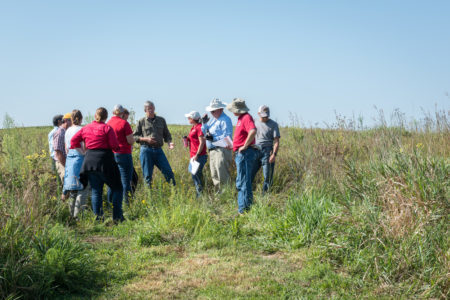
Road-tripping to Better Serve Farmers
Story by Grant Wall
Image Contributed
Each summer, over a dozen agronomists and agricultural engineers from Iowa State University pile into a fleet of cars for an annual trip around Iowa.
The trip is organized by ISU Extension and Outreach field agronomists and provides a glimpse into current practices being implemented and challenges faced by farmers throughout the state. And, while the trip helps increase individual knowledge, it also serves as an opportunity to do something more – further strengthen relationships between field and campus staff who rely on each other in their quest to provide timely, research-based information.
Extension programming at Iowa State flows along a two-way street; researchers on campus provide field staff with updated information on broad topics like weed control, crop production, fertility management, plant diseases and more. At the same time, field agronomists located across the state feed localized information back to campus, allowing faculty to tailor their research to current conditions.
This approach is applied throughout ISU Extension and Outreach, with the agricultural engineering, dairy, farm management, horticulture, beef and pork teams also employing field specialists across the state who work closely with faculty on campus.
“The ability for information to flow both ways is critical,” says Joel DeJong (’80 agricultural business, ’88 MS professional agriculture), an extension field agronomist in northwest Iowa. “There has to be new research conducted to improve crop production, and that research needs to be shared with farmers. Without research behind something you are just guessing, so having current research gives me the confidence to give better answers when I’m talking to farmers.”
Mark Licht has traveled this information highway both directions. Licht (’00 agronomy, agricultural extension education, ’03 MS soil science, ’15 Ph.D. crop production and physiology) was a field agronomist for nearly 10 years before coming to campus, and today he is an assistant professor in agronomy and extension cropping systems specialist.
“An individual in a statewide system can’t be everywhere,” Licht says. “To have field agronomists reporting back needs and information on current conditions helps us on campus be in tune with what’s going on across the state. It allows us to provide feedback that is more regionally specific and direct our research accordingly.”
Helping to facilitate this connection is Erin Hodgson, associate professor and extension specialist in entomology and leader of the crops team.
“We work hard to provide frequent interaction between faculty and statewide specialists, so there are a lot of opportunities to share information,” says Hodgson. “Field agronomists have the pulse of what is happening locally, and campus faculty provide broader information on issues that haven’t been seen in that area for a few years. It provides a great back-and-forth and strengthens our ability to provide research-based advice to farmers.”
This fosters open communication benefiting both campus and field staff.
The crops team meets weekly during the growing season to share information, while also hosting team in-services during the spring and fall. Formal sessions allow members of the team to present new information while industry specialists are brought in to provide insight into new trends and updates on their technology and its application.
Along with the structured sessions comes plenty of time to network and bounce ideas off fellow extension colleagues.
“I really look forward to those unstructured times where we can keep the conversation going,” Hodgson says. “That’s when some of our most collaborative efforts are sparked. I’ve learned to build in those open times because we want to keep the relationships within the team strong.”
It’s those unstructured moments – along with the careful research and attention to detail in the field – that allow members of the crops team to function as individuals within a much larger whole.
“We’re a network and you have to spend time maintaining that network,” DeJong said. “If you only work in your specific area then your vision can get narrow. Having a team across the state and on campus helps us keep our vision wide. It’s never bad to look outside yourself or your region to get answers to questions.”
And while the road trip in the summer is about professional development and team building, campus specialists hit the road again each winter as part of Iowa State’s Crop Advantage Series – bringing information on their research to all corners of the state.
Crop Advantage Series meetings are held across the state each January, providing a solid foundation of current, research-based crop production information to help farmers make smart, informed decisions for their farming operation. More than 2,000 people attended 14 Crop Advantage Series meetings in 2019, with sessions specifically planned for the growing conditions present at each location, making the information of critical value to those who attend.
“Crop Advantage Series allows farmers to have access to research-based topics close to home,” Hodgson says. “And it’s another great way for farmers to have access to expert faculty and staff from Iowa State.”



